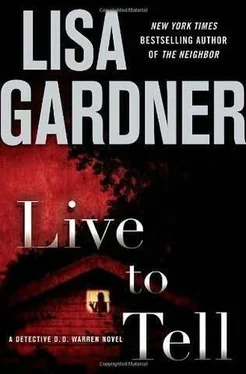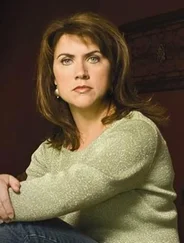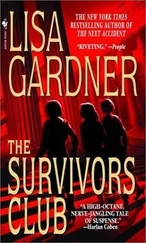Danielle shot him a look.
“With a feral child,” she continued pointedly, “there’s no caretaker present to meet the child’s needs, disrupting the normal development cycle. The child cries. Nothing happens. The child stops crying. And talking, and bonding, and having any sense of belonging to a larger world. Mentally, the child atrophies, leading to delayed speech and socialization in Ozzie’s case.”
D.D. frowned. “I thought Ozzie’s mom died when he was three. He was home alone with the body, but surely a couple of weeks of abandonment doesn’t cause everything you just described.”
“According to the ME, Ozzie’s mother had died eight to ten weeks prior to discovery. During that time, it appears Ozzie survived by eating dry cereal, uncooked pasta, and anything else he could forage from the cupboards. He was also a good climber, which helped him get water from the sink, etc. In fact, social services thought his survival skills were particularly well developed for a three-year-old-meaning maybe Ozzie’s mother was sick for a bit before she died. Maybe, in fact, Ozzie had been taking care of himself for a long while, which would explain his feral traits.”
“So Ozzie got off to a rough start,” D.D. summarized. “But eventually, the proper authorities got involved and…”
“And he ping-ponged through seven or eight foster families before landing with the Harringtons.”
“Why the Harringtons?”
“Have to ask the state. Though,” Danielle corrected herself, “the parents, Denise and Patrick, both seemed very committed to him. Some foster families request special-needs kids. They have a background with special needs-either grew up with a special-needs sibling, or have occupational training. Some believe they can make a difference and want to try.”
“And Denise and Patrick?” D.D. prodded.
“I don’t think they had any idea what they were getting into,” the nurse answered bluntly. “But they appeared committed to helping Ozzie. They struck me as the religious type-doing God’s will here on earth.”
D.D. made a note. That sounded consistent with other things they’d learned about the happy couple.
“So Ozzie had this psychotic break. What does that mean?”
“He stripped off his clothes, then went around the house with a hammer, trashing the furniture while screaming death threats.”
“So he had a particularly violent temper tantrum?”
“Oh, if he’d caught someone, he would’ve hurt them,” Danielle said seriously. “A kid in such an elevated rage-state is having an out-of-body experience. You can’t reach them with words, with love, with logic. They’re gone, in orbit. Afterward, they’ll remember almost nothing of what they said or did, including that they bashed the brains out of the family dog, or tore apart their own favorite teddy bear. Hiding is the best policy. And in the aftermath, the entire family needs post-traumatic stress counseling, especially the siblings.”
D.D. made a note of that, too. Therapist for the Harrington family? Things can come out in therapy…
“After Ozzie’s admitted here, then what happens?”
Danielle shrugged. “We started him on aripiprazole, often used for the treatment of schizophrenia and bipolar disorder. That seemed to pull him together for about eight weeks, then he began to suffer from akathisia and we had to take him off.”
“Akathisia?”
“Ozzie complained that it felt like little people were inside his skin, crunching his bones. That’s akathisia. He also started suffering from perseverative thoughts.”
“Perseverative thoughts?” D.D.
“It’s like OCD, except with thinking. He’d get a notion in his head, I want a red car, and then he couldn’t get it back out. He’d spend six, seven hours saying over and over again, I want a red car, I want a red car, I want a red car. Now substitute red rum for red car, and you can see the danger of perseverative thoughts.”
D.D.’s eyes widened. “He’s going through all this, and he’s what, seven, eight years old?”
“He’s going through all this, and yes, he’s eight. And we’re seeing more kids like him all the time. Parents think the worst thing that can happen to their five-year-old is cancer. They’re wrong; the worst thing that can happen to their five-year-old is mental illness. Cancer, the docs have tools available. Mental illness in prepubescents… There are so few drugs we can use, then the kids develop a tolerance, and by age eight we’re out of options. They require a lifetime regimen of anti-psychotic medication, except we don’t have anything left. One week we get them stabilized. The next they plunge back into the abyss.”
“Is that what happened to Ozzie?” D.D. asked.
Danielle picked up the case file, read briskly. “We took Ozzie off the aripiprazole. At which time he claimed ghosts were appearing in the windows of his room and ordering him to kill people. So we put him back on a very low dosage of aripiprazole, trying to minimize the side effects while still making some attempt at regulating his brain chemistry. In the short term, we noticed a positive change in behavior.”
“In the short term,” D.D. repeated. “Meaning in the long term…?”
“We don’t know.”
“You don’t know?”
The nurse shook her head. “His parents discharged him. Against our advice. They had moved, gotten a new place. Denise said it was time to bring him home.”
Alex held up a hand. “Whoa, whoa, whoa. Ozzie reports ghosts are telling him to murder people, and they take him home?”
“It happens.”
D.D. leaned forward. “Tell me, Danielle. Forget the file for a second. It’s you and me, trying to understand what happened to one boy. What made you think Ozzie had hurt someone? Why were you so certain this story had an unhappy ending? Why did he leave?”
Danielle didn’t answer right away. Her jaw worked. Then, just as D.D. was starting to lose hope…
“Denise found a spiritual healer,” the nurse expelled curtly. “A shaman who promised to make Ozzie all better. No chemicals. No crazy drugs. He was going to heal Ozzie by bringing him into the light.”
“Say what?”
“Exactly. This is a boy with severe psychoses. And she’s gonna cure him by bringing him to ‘an expert in negative and positive energies’? We tried to get her to reconsider, but her mind was set. We hadn’t helped her son, so she’d found someone who could.”
“I don’t think it took,” Alex said.
“Why? Your turn. What happened?”
“We don’t know. But the family’s dead.”
“The family? The whole family?” Danielle’s face paled. The nurse blinked, looking shaky, then almost panic-stricken. In the next instant, she blinked again, and her features smoothed to glass. “The news,” she murmured. “The family from Dorchester. I caught a snippet, just on the radio. That was Ozzie?”
“That was someone,” D.D. corrected.
“I thought the father did it. That’s what the reporter implied.”
“That’s what we’re trying to find out.”
Danielle looked down at the table, shaking her head. “Goddammit. We told them. We warned Denise… You have to… Andrew Lightfoot. That’s who you need to see. You want to know what happened to Ozzie Harrington, go ask Andrew Lightfoot. That arrogant son of a bitch.”
At 10:37 p.m., Patrick Harrington died. The news pissed D.D. off. It probably didn’t do wonders for him either.
She was at her desk. Not returning Chip’s phone call. Not exploring fine dining with Alex. It was Friday night, and she was doing what she inevitably did with her evenings, working her way through a stack of reports, trying to make sense of what had happened one evening in Dorchester that had now left five dead.
Читать дальше












